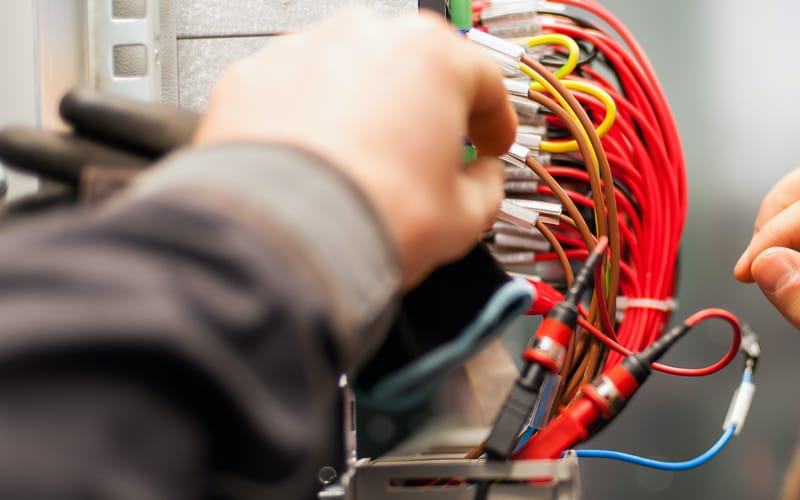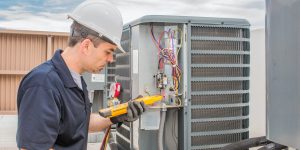
At Bolton Electrical Services, we understand the critical role that regular electrical inspections play in maintaining the safety and compliance of your property.
Whether it’s a commercial building, domestic home, or public sector facility, ensuring that your electrical systems are safe, up to standard, and functioning correctly is essential.
One of the most effective ways to achieve this is through an Electrical Installation Condition Report (EICR). We provide professional EICR testing and inspections across Bolton and the North West, helping you stay compliant and secure.
What is an Electrical Installation Condition Report (EICR)?
An Electrical Installation Condition Report, or EICR certificate, is a formal document that we produce after inspecting the electrical installations within your property. This comprehensive assessment helps identify any faults or issues, such as worn-out wiring, overloaded circuits, or faulty equipment, that could pose safety risks.
The primary goal of an EICR is to ensure that your electrical systems are safe, functioning efficiently, and meet current legal standards. By identifying these potential hazards early, we can help you prevent accidents like electrical shocks or fires before they happen.
Legal Requirements for EICR
In the UK, an EICR is not just a recommendation—it’s a legal requirement for many properties. For commercial businesses, it’s mandatory to have an EICR conducted every five years to ensure compliance with the Electricity at Work Regulations.
For domestic landlords, an EICR is also required for rental properties, ensuring tenants are protected from potential electrical hazards.
Failing to carry out these inspections can result in fines, legal action, or worse—putting the safety of occupants at serious risk. We ensure your property is fully compliant with UK electrical safety laws, giving you peace of mind.
Why Do You Need an EICR?
Ensuring Electrical Safety and Compliance
Regular EICR testing is essential for ensuring the safety of your property’s electrical systems. Over time, electrical installations can deteriorate or become damaged, leading to potential fire hazards, faulty wiring, and circuit overloads.
By conducting an EICR, we can identify these risks early and help you prevent accidents before they occur. Protecting employees, tenants, and building occupants from electrical hazards is not only a legal obligation but also a moral responsibility.
With our professional EICR testing, you can rest assured that your property meets the highest safety standards.
Reducing the Risk of Electrical Failures
One of the key benefits of an EICR is its ability to detect potential problems before they escalate into major electrical issues. From defective wiring to overloaded circuits, these problems can result in costly repairs, power outages, or even dangerous electrical faults if left unchecked.
By identifying these issues early, an EICR can save you significant expenses in the long run. For instance, we’ve seen cases where an EICR caught deteriorating insulation that could have led to a fire or discovered circuits that were being pushed beyond their capacity.
Early detection through regular EICRs keeps your property safe and minimises the risk of unexpected failures.
Legal and Insurance Benefits
Having an up-to-date EICR not only ensures compliance with UK electrical safety regulations but also provides essential support when dealing with legal and insurance matters.
Many insurance companies require proof of regular electrical inspections, like an EICR, to validate coverage. In the event of an electrical incident, having a valid EICR can protect you from penalties and ensure that your insurance claims are not voided due to lack of proper maintenance.
At Bolton Electrical Services, we help you stay compliant with both legal and insurance requirements, ensuring your property remains safe and protected.

What Does an EICR Check?
During an EICR, we look for a range of common electrical issues that could pose a risk to your property. These include faulty wiring, circuits that are not properly earthed, overloaded electrical systems, and equipment that has deteriorated over time.
These problems are often hidden but can lead to severe hazards, such as electrical shocks, fires, or system failures. Addressing these issues promptly not only protects your building but also prevents costly repairs and downtime.
What is Checked During an EICR Inspection?
An EICR inspection involves a thorough examination of your property’s electrical system to ensure it complies with current regulations. Some of the main components we check include circuit breakers, wiring, light fittings, switchgear, and electrical panels.
We assess the overall condition of the system and check for any signs of wear, damage, or non-compliance. By the end of the inspection, you’ll receive a detailed report outlining any issues that were found and recommendations for necessary remedial work.
How Long Does an EICR Take?
The time it takes to complete an Electrical Installation Condition Report (EICR) can vary depending on several factors. One of the most significant factors is the size of the property. Smaller domestic properties, such as single-family homes or flats, may take only a few hours to complete the inspection.
However, larger commercial buildings with more complex electrical systems will typically take longer, sometimes a full day or more, due to the scale of the installation and the number of circuits that need to be tested.
The complexity of the wiring, the age of the system, and whether any prior issues need further investigation will also influence the duration. We tailor our services to ensure minimal disruption while conducting thorough and comprehensive inspections.
Who Needs an EICR?
Commercial Properties
For commercial properties, an EICR is not just a safety measure but a legal requirement. UK regulations stipulate that commercial properties must undergo an EICR every five years to ensure the electrical installations are safe, compliant, and functional.
This is especially important for businesses that rely on electrical systems to power their operations. An up-to-date EICR helps prevent electrical failures that could cause downtime, safety hazards, or even legal action.
Ensuring that your commercial property is compliant not only protects your business but also demonstrates a commitment to health and safety standards, safeguarding employees, clients, and visitors alike.
Domestic Properties
Landlords are legally required to ensure that rental properties undergo an EICR at least every five years, or more frequently if specified by local regulations. This is crucial for ensuring the safety of tenants and complying with the Landlord and Tenant Act, which mandates safe living conditions.
An EICR identifies any electrical risks within the property, such as faulty wiring or overloaded circuits, that could endanger tenants.
Homeowners can also benefit from an EICR to check the integrity of their electrical systems and address any issues before they lead to larger problems, offering peace of mind for the ongoing safety of the property.
EICR Frequently Asked Questions
How long does an EICR take?
The duration of an EICR can vary depending on the size and complexity of the property. For smaller domestic properties, an inspection may take just a few hours.
However, larger commercial properties with more complex electrical systems can require a full day or even longer.
Factors like the age of the installation, the number of circuits, and any pre-existing issues can also impact the time required to complete the EICR.
What does EICR stand for?
EICR stands for Electrical Installation Condition Report. It’s a formal document issued after a detailed inspection of a property’s electrical system, assessing its safety and functionality. The report identifies any faults or potential hazards, ensuring that the installation complies with safety standards.
How often do I need an EICR?
The frequency of EICR testing depends on the type of property. For commercial properties, an EICR is required every five years to comply with legal safety standards. For rental properties, landlords are also required by law to conduct an EICR every five years or when there is a change of tenancy.
In domestic settings, it’s recommended to have an EICR conducted every ten years, although older properties may benefit from more frequent inspections.
What happens if my property fails an EICR?
If your property fails an EICR, it means there are safety concerns that need to be addressed before the electrical system can be considered compliant.
The report will detail any issues, such as faulty wiring or overloaded circuits. Once these issues are rectified through remedial work, a re-inspection will be required to confirm that the property’s electrical installation meets the necessary safety standards.
